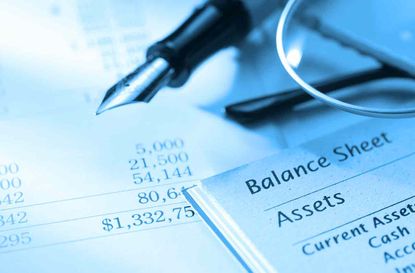
When you purchase through links on our site, we may earn an affiliate commission. Here’s how it works.

Most successful investors agree with the notion that in crises, cash is king. That's especially true in a crisis that leads to entire industries shutting down for an uncertain period of time, depriving corporations of all of their revenue in some cases. Having a strong balance sheet can be the difference between weathering the storm and going out of business.
That's true even considering the massive interventions by global governments and central banks. It's no surprise that high-yield corporate bonds are struggling. The companies they finance had exhibited risk to their interest-paying ability long before this existential crisis hit. Should the COVID-19 crisis last longer than the optimistic assumptions, a lot of companies simply won't make it.
In this environment, it's natural to look for blue chips with the strongest balance sheets. While stable financials alone don't guarantee outstanding returns, in times of uncertainty, being able to determine which companies are soundly built is essential for anyone investing in stocks.
Be a smarter, better informed investor.
Save up to 74%
Profit and prosper with the best of expert advice on investing, taxes, retirement, personal finance and more - straight to your e-mail.
Profit and prosper with the best of expert advice - straight to your e-mail.
But which balance sheet factors should you consider? There are many traditional indicators when it comes to gauging financial stability, but while some of those will likely prove useful even under today's extraordinary circumstances, others could lead to grave mistakes.
Starting with balance sheet analysis is usually how some "bottom-up" analysis methods begin, which means these measures don't take industry- or sector-wide trends into account.
But the current crisis also makes sector- and industry-level analysis important, if not downright necessary.
The time frame of your investment style will be crucial in deciding which sectors you choose, because even the most-affected sectors will recover. We need operational airlines. The oil industry might look different because of the current supply/demand shock, but it's not going away. Tourists will return to hotels. Targeted government interventions will help the hardest-hit industries, though a prolonged crisis still could wipe out the equity of some companies.
While timing might be very tricky here, one thing seems likely: The most financially stable companies are the most likely to hold up and flourish following the crisis. They might even increase their market share during the crisis and subsequent recovery. That's because they might eat up share of folded competitors, and in some cases, they'll be able to aggressively gobble up underpriced assets, including other companies.
That's why balance sheets matter – especially in the case of currently struggling sectors and industries.
Now, we'll look at some of the most traditional measures used to evaluate the balance sheets of non-financial firms. (Gauging the exposure of most financial firms, especially mid- and large-cap banks, is close to impossible here, even in the wake of the Fed's unlimited quantitative easing program and the largest stimulus package in U.S. history.)
Profitability ratios might seem out of place in a balance sheet analysis, but the two are inextricably linked. For instance, the return on equity requires input from the balance sheet and income statement. Further, a company's net profits get added to the shareholder equity account annually. So, money-making companies are building equity, and money-losing companies are drawing down equity, which influences a whole host of other ratios.
Rather than committing yourself to a full-throated earnings analysis every time, here are three fundamental blended ratios to consider:
A smart way to get a bead on the health of a company's balance sheet is to see what other investors think about it. Bond investors are some to the smartest investors on Wall Street, and their opinion about what a loan (i.e., bond) is worth – which is manifest in the yields on bonds – says a lot about the company's balance sheet and future prospects.
Balance sheets and other metrics of risk clearly are not the only things that matter in this environment. You should apply everything above to the real-life scenarios playing out in front of you. For instance, right now, you should be considering company-specific risk to the coronavirus for every prospective stock you evaluate.
But in the coming weeks and months, it's perhaps more important than ever to evaluate balance sheets – of everything you currently own, as well as any prospective stocks that suddenly look attractive to you.
Remember, companies with strong balance sheets can:
Understanding what the balance sheet says about their strengths and weaknesses can be enormously rewarding in terms of building – and preserving – your capital.